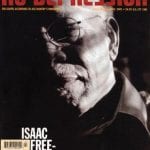Christy McWilson – The other side of midnight
“I can’t sit down with a guitar and figure out the chords until the song is really cemented in my head, or I’ll screw it up. But sometimes it’s really hard. I have a lot of really weird chords in my songs, and I think that’s what other musicians like about them, sort of — sometimes they hate having to learn ’em — but it’s because I don’t have a structure in mind, I just let the song sing to me, and when it’s all done, then I try to find out the chords.” She laughs a little.
“It’s been a disaster, quite a few times. Like ‘Bed Of Roses’, for instance, I unintentionally changed keys, and I had to try to get back to the original key. That one was a drag, I was calling everyone up, Help me! Help me! That was a long time before I could get that one straightened out.”
And her songs are, much like Billy Joe Shaver’s (and few others), almost strictly true.
“Give or take a grain of salt,” she says. “A lot of people think that I’m writing about Scott sometimes, and it’s unfair. Like ‘Little Red Hen’ was more about being in the Picketts than about Scott. I was kind of shocked when a lot of people referred to Scott about that, and that wasn’t fair.
“I’m a storyteller about myself. I think a lot of men…I listen to Scott’s songs, he makes up stories. They’re like creative writing classes. I’m more, This is who I am. I just am, I hate to say this, a sincere kind of a gal.”
Brutally honest, too. There’s still plenty of stigma attached to mental instability, but McWilson won’t back away from the truth. Offers it freely.
“I kind of decided it wasn’t a secret anymore,” she says. “That’s part of who I am. Some people I’ve noticed have been afraid of me, like I’m going to wield an axe or something. And I’m not. I’m not violent, but I do get really irritable if I don’t take medicine, and it’s really awful.
“It’s a chemical imbalance. They actually think it’s related to epilepsy, and they think it’s a mood seizure. I think that’s right. Because when I get manic episodes, it’s really horrible; I can feel ’em coming on and I get agitated and everything bothers me.
“And then I can’t sleep. I won’t sleep for DAYS at a time, and that’s when you really start getting weird thoughts. But that’s where I get a lot of my songwriting done, because I’m up all night. And it’s pretty awful.”
Nothing like being reminded how precariously the creative process rocks atop a chasm few of us would care to visit.
“My psychiatrist said that bipolar people are over-represented in the arts,” says McWilson. “I think there is this weird sensitivity that you have, but it is a mixed blessing. That is who I am. I think it gives me insights and I think I feel a lot, but the flipside of that coin is that I run around sometimes — I can tell when I’m bad — like if there’s somebody in a wheelchair in front of me in the grocery store, I have to fight back an urge to kick that person out of the way. And that’s not who I am, that’s the disease talking.”
She calls back a few days later and leaves one last message. “This probably isn’t that important, although it seemed like it was at 2:30 in the morning when I woke up and I was thinking. We talked about the agitation and the manic thing, but the flipside of that is the depression, the kind where you can’t even get up off the bed. A lot of songs come at that period. An example of that would be ‘Sheep In The Pasture,’ which was a little visual interpretation of how I felt, and ‘The Lucky One’. It’s probably not that important, but I just started thinking about that at 2:30 in the morning, my mental pacing time.”
ND co-editor Grant Alden lives in Nashville, TN, with his wife, two cats, and a wide variety of coffee-making appliances.




